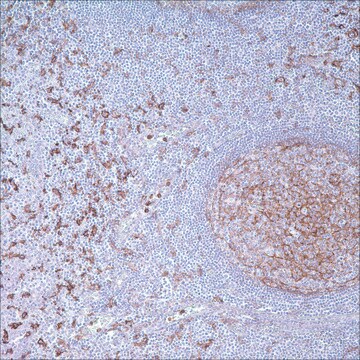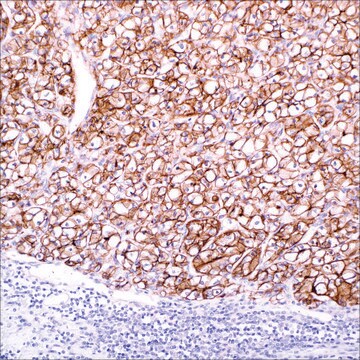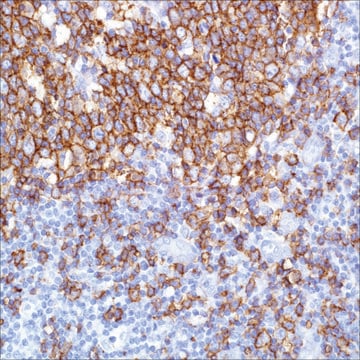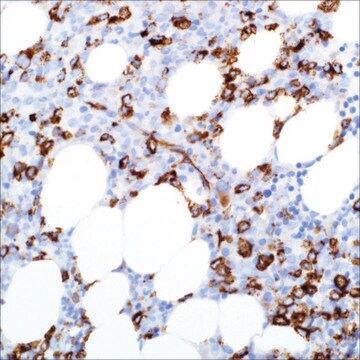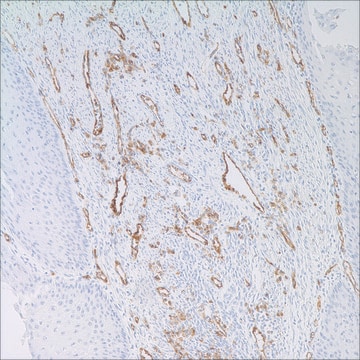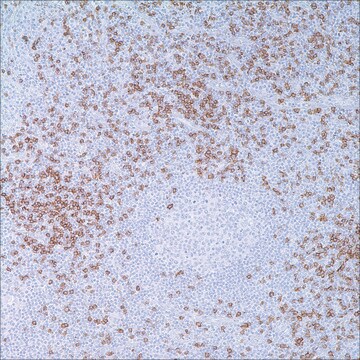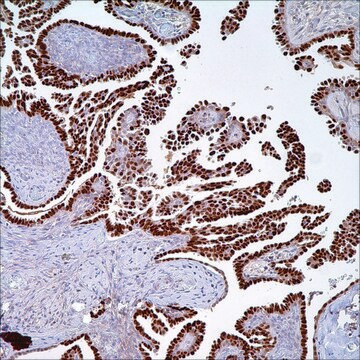Recommended Products
biological source
mouse
Quality Level
100
500
conjugate
unconjugated
antibody form
culture supernatant
antibody product type
primary antibodies
clone
6H6, monoclonal
description
For In Vitro Diagnostic Use in Select Regions (See Chart)
form
buffered aqueous solution
species reactivity
human
packaging
vial of 0.1 mL concentrate (198M-14)
vial of 0.5 mL concentrate (198M-15)
bottle of 1.0 mL predilute (198M-17)
vial of 1.0 mL concentrate (198M-16)
bottle of 7.0 mL predilute (198M-18)
manufacturer/tradename
Cell Marque™
technique(s)
immunohistochemistry (formalin-fixed, paraffin-embedded sections): 1:25-1:100
isotype
IgG1κ
control
blastic plasmacytoid dendritic cell neoplasm
shipped in
wet ice
storage temp.
2-8°C
visualization
cytoplasmic
Related Categories
General description
CD123 IHC expression has been studied in 157 acute myeloid leukemia (AML) bone marrow biopsies and/or marrow particle preparations, and correlated with the morphologic, immunophenotypic, and cytogenetic features and with the presence of FLT3-ITD and NPM1 mutations. CD123 IHC expression has been seen in 40% of AML, across a wide spectrum of 2008 World Health Organization subtypes and was most frequent within the intermediate risk group. Compared with CD123 IHC negative AML, CD123 IHC positive AML demonstrated higher marrow blast percentages (median 69%), monocytic differentiation (33/63 cases), and CD34 negativity (29/63 cases). 83% (25/30) FLT3-ITD-mutated AML were CD123+ and 62% (18/29) NPM1-mutated cases were CD123 IHC+ (P=0.0052). CD123 IHC+AML presents with characteristic pathologic features, some of which may be related to underlying FLT3-ITD and/or NPM1 mutations.
Quality
 IVD |  IVD |  IVD |  RUO |
Linkage
Physical form
Preparation Note
Other Notes
Legal Information
Not finding the right product?
Try our Product Selector Tool.
Storage Class Code
12 - Non Combustible Liquids
WGK
WGK 2
Flash Point(F)
Not applicable
Flash Point(C)
Not applicable
Certificates of Analysis (COA)
Search for Certificates of Analysis (COA) by entering the products Lot/Batch Number. Lot and Batch Numbers can be found on a product’s label following the words ‘Lot’ or ‘Batch’.
Already Own This Product?
Find documentation for the products that you have recently purchased in the Document Library.
Our team of scientists has experience in all areas of research including Life Science, Material Science, Chemical Synthesis, Chromatography, Analytical and many others.
Contact Technical Service

